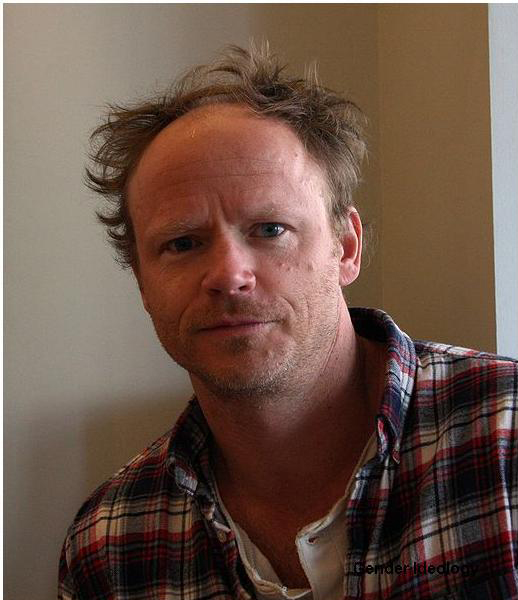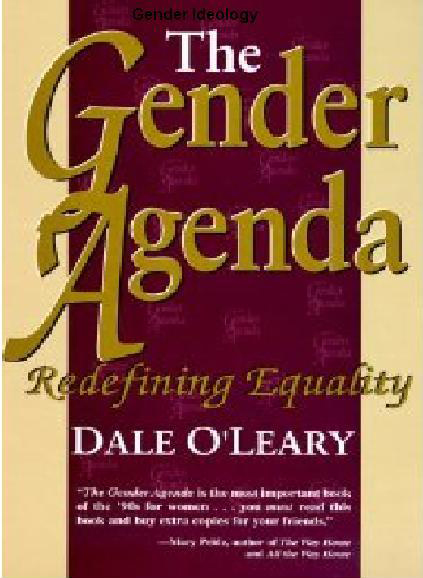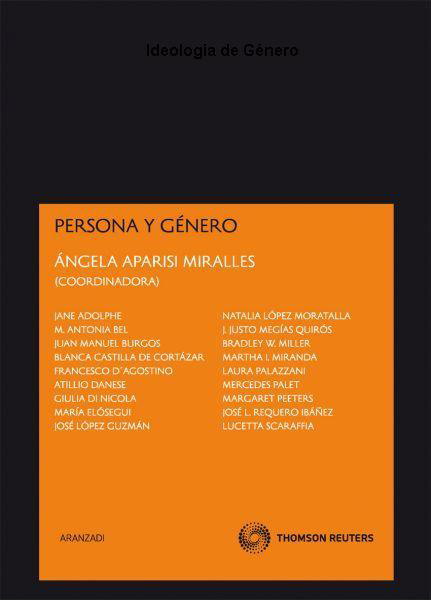Gender Ideology
Gender ideology, the second wave of feminism, is based on
a fundamental biological error which turned into a lie, followed by radicalization and hatred.
Please find hereinafter some brief
information on the history, scientific literature and reality of gender
ideology.
|
I.
History
Gender Ideology
Excerpt
from an interview with Dale O'Leary, American specialist in gender studies.
By B.Wlodzimierz Redzioch
 Dale
O’Leary Dale
O’Leary |
|
|
Dale O'Leary is
author of the book “The Gender Agenda: Redefining Equality”.
The last
century was a period of the righteous fight of women against abuses, unjust treatment
and humiliating stereotypes. The result of this fight was the rights that
guaranteed women equal status. In the 1970s the feminist movement was much
influenced by radical ideologies. These ideologies caused that the fight for
equal rights for women became a pretext for destroying the traditional family
and motherhood as well as for promoting sexual dissolution. By now various
offices, which are established by governments and which are to guarantee
equal status for women and men, serve to promote radical feminist ideas more
than to protect true interests of
women and society.
Wlodzimierz Redzioch: - What were the first objectives
of the feminist movements in the West?
Dale O'Leary: - Generally speaking, one can say that in the second half of the 20th
century the Western societies fought to combine equality between woman and
man with their obvious biological differences. In the 1960s women protested
against the laws and customs, which made them being treated differently than
men. Reacting to those protests the governments introduced laws, which
guaranteed equality for women. Women were able to use them very quickly - the
number of female students at universities, employed women and those having
top governmental posts increased.
- Why did the fight for
equal rights for women change into the fight against men and family at some
moment?
- In the 1970s the
radicals, who regarded women as the prototype of the 'afflicted class' and
marriage as well as 'obligatory heterosexualism' as
tools of oppression, joined the feminist movement. This philosophical
movement comes from Friedrich Engels and his analysis of the origin of the
family. In 1884 Engels wrote, 'the monogamous family remains true to its
historical origin and clearly reveals the antagonism between the man and the
woman expressed in the man's exclusive supremacy'. Shulamith Firestone in her book 'The
Dialectic of Sex', published in 1970,
modifying the idea of the class struggles, calls to sex-class revolution: 'In
order to eliminate sex-classes the inferior class (women) must rebel and take
control over reproduction... That means that the aim of the feminist
revolution is not only to remove men's privileges, which was the aim of the
feminist movement, but also to eliminate the difference between sexes: these
differences will never have any meaning'.
- This explains why
this new feminism did not only act against men but also against motherhood...
- According to
Firestone the essence of oppression of women is motherhood and upbringing of
children. Those who support this stand think that abortion on demand,
contraception, total sexual freedom, women's employment and keeping children
in nurseries, which the state subsidizes, are the essential conditions of
women's liberation. Nancy Chodorow in 'The
Reproduction of Mothering' claims that until women perform
educational-upbringing functions children will grow seeing mankind as divided
into two different and, according to her, unequal classes. This is the reason
why class oppression is being tolerated.
- Does that mean that
radical feminists want children to live without family?
- Yes. The new
feminism wants to abolish biological family. Alison Jagger in the manual for women shows what is the desired result of
the sex-class revolution. 'Abolishing biological family will also
eliminate the need of sexual oppression. Male and female homosexualism and extramarital sexual relationships
will not be seen as alternative options in the liberal optics... The very
'institution' of sexual relationships, where woman and man play definite
roles, will disappear. At last mankind will return to its natural, multiform
and pervasive sexuality'.
- How did the term
'gender' originate?
- The problem, which those
who promoted revolution against family, had to face was to eliminate sex
classes, which are conditioned by biological differences between women and
men. The solution
of this dilemma was the theses of Dr. John Money,
- How did feminists
use Dr. Money's theories?
- In her book 'Sexual
Politics', 1969, Kate
Millet wrote, 'there is no difference between sexes at the moment of
birth. Psychosexual personality is something that is learnt after birth'.
Thus the idea of gender as a social phenomenon was introduced into the
feminist theories. The gender ideology caused that the priority of the
feminist movement ceased to be the fight against politics that discriminated
women but the priority was to the fight against the ideas that showed the
differences between women and men and emphasized the fundamental role of
woman in the sphere of education and upbringing.
- Feminists very often
used the forum of the United Nations to impose their radical ideas on the
world. Was it the case of gender, too?
- Till the 1990s the
UN documents emphasized the need to eliminate all forms of women's
discrimination, but in the 1990s the problem of gender became the major one.
In the UN brochure, which was made by the INSTRAW agency and entitled 'Gender
Concepts', the term 'gender' is defined as 'system of roles and relationships
between woman and man, which is not biologically determined but depends on
the social, political and economic context. As biological sex is given,
gender is a product'. A big problem is that sometimes people who use the term
'gender' are not aware of its ideological roots.
- Perhaps we can see
that best at some EU world conferences, during which the delegates of many
countries signed the documents, in which the term 'gender' was used, not
knowing what it exactly meant and not knowing the difference between 'gender'
and 'sex'.
- That's right. It is
worth mentioning the World Conference on Women in
- It is obvious that
the difference between the roles of men and women is the consequence of
natural biological differences! A man cannot be pregnant, cannot
breast-feed...
- It is obvious, but
from the perspective of the gender ideology it cannot be accepted that a
woman can choose motherhood as her most important calling. The words of
Simone de Beauvoir confirm that. When Betty Friedan asked her whether women
should have the right to choose staying at home and raising children the
writer answered, 'Women should not have such a choice because if such a
possibility really existed too many women would use it'.
- These are very
meaningful words. Let us come back to Dr. Money's theory. Has it been
scientifically confirmed?
- Gender ideology
became more and more popular whereas its theoretical motivation
disintegrated. Dr. Money's theories have been discredited by researches
concerning brain development. The prenatal researches have shown that before
birth the brains of a boy and girl differ, which influences among other
things their different perception of movements, colours and shapes. For
example, it causes that there is boy's ‘biological preparation' to use male
toys and with girls to use female toys. Women, commencing with mother's womb,
are being equipped with special sensitivity to other people, which is needed
to perform the mother's role.
- And what of it? Some
feminists do not want to acknowledge the unique role of woman in society and
they ignore the researches, which confirm that!
- This is a big
problem. The scientists who examine the earliest stages of child's
development and the development of human brain, express their concerns that the
researches concerning the meaning of the relationship between mother and
child are ignored by those who would like to see woman as only a labour force
and see children only in the nursery school.
- The gender ideology
is in favour of a new definition of marriage, which would also embrace
couples of the same sex. In recent years there have been many publications
that suggest that there is no essential difference between children raised by
couples of the same sex and those raised by natural parents. Are such theses
reliable?
- Those who have
analyzed such researches claim that they are no valid. According to Prof.
Lynn Wardle, 'Most researches concerning homosexuals' parenthood are based on
inadequate
documentation from the
point of quantity as well as on false methodology and analysis (some of
little more than anecdotal quality), and consequently, the empirical base is
too poor to be decisive as far as social politics is concerned'. On the other
hand, numerous researches confirm that the presence of father and mother
increases the physical and mental state of a child. Patrick Fagan, Heritage
Foundation, collected much evidence that having mother and father who live together is very important to children. Whereas children
who 'are brought up by women or whose parents are divorced incur a greater
risk to experience poverty, abuse as well as educational and emotional
problems'. The future of the society depends on children and therefore, our
duty is to regard the good of children as our priority.
Source: www.familiaqueesyquenoes.org
II. Literature
 Ángela Aparisi Miralles |
PERSONA Y GÉNERO (Person and Gender)
|
|
Sumario
Persona y género: ideología y realidad. Cap. I: Origen y desarrollo de
las teorías de género.( Riflessioni sul contesto storico culturale in cui nasce la teoría del gender.
Tres diversos modelos filosóficos sobre la relación entre sexo y género.
Simone de Beauvoir. Teorizzaczione del "gender". Tra filosofia e diritto. The gender
ideology and the global language). Cap.II. Consecuencias sociales, políticas y jurídicas de la
"ideología de género"
(The meaning of "gender" within the United Nations system. La irrelevancia jurídica de la diferenciación
sexual en el Consejo de Europa. La
ideología de género en el derecho español. Sexual orientation and the legal regulation of marriage. Nuevas tecnologías reproductivas y postfeminismo de género. Género y cambio social en la
edad moderna). Cap. III: Género y realidad (Una aproximacion científica a la ideología de género: cerebro de mujer, cerebro de varón.
Aproximación psicológica: el sexo, el género y sus derivados. Ideologia di genere e persona. Reciprocidad hombre-mujer:
igualdad y diferencia. Dos formas de afrontar la identidad sexual:
personalismo e ideología de género. Cultura, naturaleza y persona: género y
estructura personal).
Editorial
Obra publicada en colaboración con el Instituto de Ciencias para la Familia
de la Universidad de Navarra. En el debate actual sobre los derechos humanos
ocupa un lugar destacado la cuestión del género. Ciertamente, ninguna
sociedad democrática puede obviar la necesaria promoción social y jurídica de
la igualdad varón-mujer. No obstante, tras las diferentes "teorías de
género" subyacen planteamientos diversos, distintos modos de entender a
la persona y de articular la relación sexo-género. Este libro, con una
marcada visión interdisciplinar, recoge las aportaciones de reconocidos
especialistas internacionales en el tema, en un intento de clarificar la
cuestión abordada. Desde diversas perspectivas, el hilo conductor del volumen
es la apuesta por el modelo antropológico, y filosófico-jurídico, de la
complementariedad o corresponsabilidad varón-mujer. Se entiende que éste
permite hacer compatibles, de manera adecuada, las categorías de la igualdad
y la diferencia. Asimismo, aporta valiosos elementos a la discusión que
actualmente plantea la articulación del género en la estructura personal del
ser humano, con las implicaciones jurídicas que ello conlleva.
Instituto de Ciencias para la Familia | Universidad de Navarra | 31009
Pamplona | Tel.: 948 425 639 |Mail: icf@unav.es
The end of the Gender Experiment
Nordic Countries defund Gender Ideology
 Harald Eia
Harald Eia
A devastating
blow for “Gender Theory”: the Nordic Council of Ministers (a regional inter-governmental
co-operation consisting of
The decision was made after
the Norwegian State Television had broadcasted a television documentary in
which the hopelessly unscientific character of the NIKK and its research was
exposed.
The producer of the series
is Harald Eia, a
Norwegian comedian, who had gained some popularity in
In his documentary, Mr. Eia just went, in the company of a camera team, and asked
some innocent questions to the leading researchers and scientists of the
NIKK. Then he took the replies and brought them to leading scientists in
other parts of the world, notably in the
What is more, the bogus was
exposed to ridicule in front of the entire TV audience, and people began to
ask why it was necessary to fund with 56 million Euro of taxpayers’ money
some ideology-driven “research” that had no scientific credentials at all.
As it turned out, a few
innocent questions, asked by a comedian, were sufficient to bring down the
pompous edifice of “Gender Theory”. It is hoped that the lesson will be heard
in other countries, or in the EU and the UN, where this ideology still holds
sway in the corridors of power…
To watch Mr. Eia’s documentary in full length, visit this site and,
when asked to enter a password, type “hjernevask”
(the Norwegian word for “brainwash”, which was aptly chosen as title for the
documentary). Non-Norwegians don’t need to worry – there are English
subtitles.
Part 1
– ”The Gender Equality Paradox”
Part 2 – ”The Parental Effect”
Part 3 – ”Gay/straight”
Part 4 – ”Violence”
Part 5 – ”Sex”
Part 6 – ”Race”
Part 7 – ”Nature or Nurture”
Source: Posted on 5 Sept. 2012 by J.C. von Krempach, J.D., in www.turtlebayandbeyond.org

